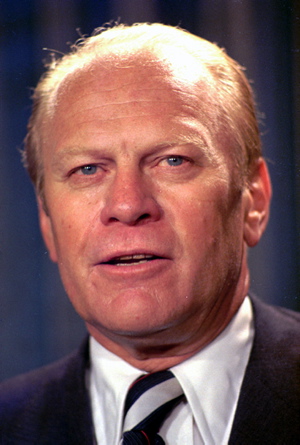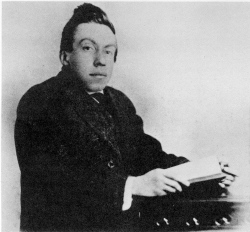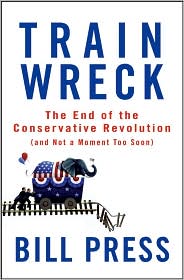“‘There are times when an abortion is necessary. I know that. When you have a black and a white,’ he told an aide, before adding, ‘Or a rape.’” Another round of newly-released Nixon tapes sheds more light on the dark and troubling imaginings of the 37th president. “‘What I really think is deep down in this country, there is a lot of anti-Semitism, and all this is going to do is stir it up,’ Nixon said…’It may be they have a death wish. You know that’s been the problem with our Jewish friends for centuries.’” Class act, this guy.
Category: The Seventies
The Ghosts of Ford and Bourne.
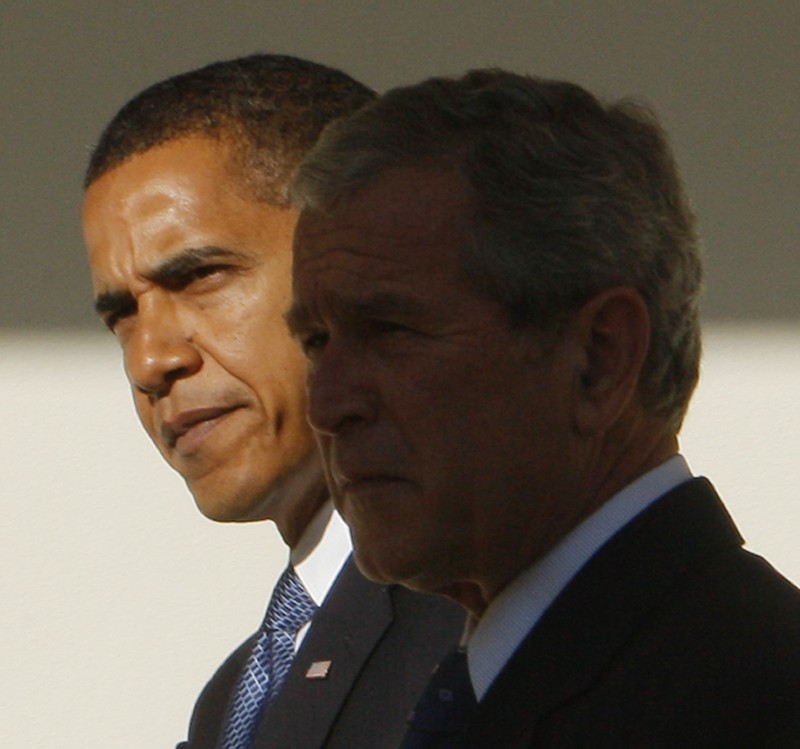
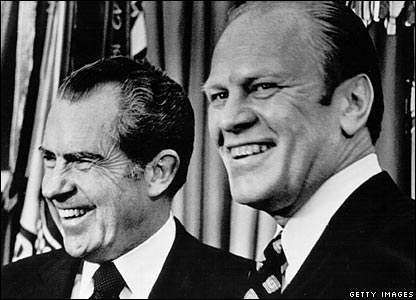
Well, I’ve been traveling over the past few days, and thus haven’t been following the news as closely as usual. Still, even given President Obama’s health care announcement on Monday (highly reminiscent of the NRA in that it purports to let the big players in the health care industry help write the codes, so to speak) and the welcome declaration on Wednesday that the administration would soon seek a new regulatory apparatus for derivatives markets, Franklin Roosevelt was not the first president that came to mind as a point of reference for Obama this week.
No, that would be Gerald Ford, who, most historians agree, was an honorable man thrust into a thorny dilemma by the crimes of his predecessor, and who grievously hamstrung his own brief administration by deciding to pardon Richard Nixon. And now, it seems, history gets dangerously close to repeating itself. For, it’s moved beyond obvious that the Dubya administration not only willfully engaged in torture — clearly, bad enough — but did so to compel false confessions of an Iraq-9/11 connection that they knew never existed. And yet, we’ve already witnessed the ungainly sight of President Obama equivocating on the question of prosecutions in the name of some dubious “time for reflection, not retribution.” (Never mind that, as President Obama reminds us on other matters, wounds, like corruption, fester in the dark.)
This week, President Obama has compounded his recent error — twice. In the first of two eleventh-hour reversals, Obama — who has promised us “an unprecedented level of openness in government” many times over — instead chose to side with the publicists of the Pentagon and block the court-ordered release of new photographs detailing detainee abuse: “‘The publication of these photos would not add any additional benefit to our understanding of what was carried out in the past by a small number of individuals,’ Obama said yesterday. ‘In fact, the most direct consequence of releasing them, I believe, would be to further inflame anti-American opinion and to put our troops in danger.‘” (How bad are they? If Sy Hersh is correct, and there’s no reason to think he isn’t, they could be very, very bad.)
Then, today, the Obama administration announced they will continue using extra-legal military tribunals, not federal courts or military courts martial, for Gitmo suspects. “‘Military commissions have a long tradition in the United States,’ said Obama in a statement. ‘They are appropriate for trying enemies who violate the laws of war, provided that they are properly structured and administered.’” (The key line of the WP story: “In recent weeks, however, the administration appears to have bowed to fears articulated by the Pentagon that bringing some detainees before regular courts presented enormous legal hurdles and could risk acquittals.)”
Obama’s statements aside, the arguments — re: excuses — in favor of blocking the release of these no-doubt-horrifying photos and maintaining extralegal tribunals — now with 33% less illegality! — are the thin gruel you might expect. The WP’s Dan Froomkin already eviscerated the former quite devastatingly, while Salon‘s Glenn Greenwald, laudable as usual, has taken point on the idiocy of the latter: “[W]e’ll give due process as long as we’re sure we can win, and if we can’t, we’ll give you something less.” In both cases, the principle animating the advice given to President Obama seems mainly to be the usual self-serving, CYA behavior of Dubya holdovers at the Pentagon.
But that doesn’t absolve President Obama of his failures here. For whatever reason — perhaps he’s trying to smooth things over in these areas so he can focus on the considerable domestic problems on his plate — Obama is increasingly making the exact same mistake as Gerald Ford. As other commentators have pointed out, by shoving the rampant illegalities of the GWoT under the rug — or worse, perpetuating them — Obama is dangerously close to making his administration retroactively complicit in the crimes of the previous administration.
Now, I’d like to move on to fixing the economy and universal health care — not to mention voting, lobbying, and campaign finance reform — as much as the next guy., But sidestepping the tough choices on torture and the imperial presidency, as Paul Krugman (whom I’ve had issues with but am in complete lockstep with here) noted a few weeks ago, is simply not an option, if we are to maintain anything resembling our national soul after this egregious wallowing in torture and illegality.
Speaking of which, a quick comment on the emerging question of what and when Speaker Pelosi knew about torture (which the Republicans have shamelessly latched onto like a life raft — see in particular Karl Rove frantically pointing at her to save his own skin the other day. You can almost smell the desperate flop sweat exuding from his every pore.) Well, let’s look into it. Commissions, investigations, prosecutions — let’s quit screwing around and start getting to the bottom of this fiasco. I can’t believe I have to keep writing this like it’s even a bone of contention, but look: If we can’t get it together enough to collectively agree that torture is both immoral and illegal, and that those who designed and orchestrated these war crimes during the Dubya administration be subject to investigation, prosecution, and punishment, then we might as well call this whole “rule of law” thing off. As ethicist David Luban noted yesterday in congressional testimony, the relevant case law here is not oblique. Either the laws apply to those at the very top, or they don’t — in which case, it’s hard to see why anyone else should feel bound to respect them either.
Which brings me back to pragmatism. Hey, in general, I’m all for it, particularly when you consider all the many imbecilities thrust upon the world by the blind ideological purity of the neocons of late. But, let’s remember, the limits of pragmatism as a guiding national philosophy were exposed before all the world before Obama, or even FDR, ever took office. When, after several years of trying to stay well out of the whole mess, Woodrow Wilson entered America into World War I in 1917, the very fathers of Pragmatism, most notably philosopher of education John Dewey, convinced themselves war was now the correct call and exhorted their fellow progressives, usually in the pages of The New Republic, to get behind it. (Many did, but others — such as Jane Addams and Nation editor Oswald Villard — did not.) War went from being a moral abomination to a great and necessary opportunity for national renewal. Given it was a done deal, the pragmatic thing to do now was to go with the flow.
Aghast at this 180-degree shift in the thinking of people he greatly admired, a young writer named Randolph Bourne called shenanigans on this “pragmatic” turnaround, and excoriated his former mentors for their lapse into war fervor. “It must never be forgotten that in every community it was the least liberal and least democratic elements among whom the preparedness and later the war sentiment was found,” Bourne wrote. “The intellectuals, in other words, have identified themselves with the least democratic forces in American life. They have assumed the leadership for war of those very classes whom the American democracy had been immemorially fighting. Only in a world where irony was dead could an intellectual class enter war at the head of such illiberal cohorts in the avowed cause of world-liberalism and world-democracy.“
Now, you’d be hard-pressed to find a bigger cheerleader for the progressives than I. But the fact remains that Bourne, who perished soon thereafter in the 1918 influenza epidemic, was prescient in a way that many of the leading progressive thinkers were not. The emotions unleashed by the Great War and its aftermath (as well as the sight of the accompanying Russian Revolution) soon fractured completely the progressive movement in America, and proved exceedingly fertile soil for the reascendancy of the most reactionary elements around. (Back then “Bolshevik” and “anarchist” were preferred as the favorite epithets of the “One Hundred Percent American” right-wing, although “socialist,” then as now, was also in vogue. At least then they had real socialists around, tho’.) And the pragmatic writers and thinkers of TNR, who thought they could ride the mad tiger through a “war to end all wars,” instead found their hopes and dreams chewed up and mangled beyond recognition. They wanted a “world made safe for democracy” and they ended up with the Red Scare, Warren Harding, and an interstitial peace at Versailles that lasted less than a generation.
The point being: however laudable a virtue in most circumstances, pragmatism for pragmatism’s sake can lead one into serious trouble. And, as a guiding light of national moral principle, it occasionally reeks. As Dewey and his TNR compatriots discovered to their everlasting chagrin, you can talk yourself into pretty much anything and deem it “pragmatic,” when it’s in fact just the path of least resistance. And, when your guiding philosophy of leadership is to always view intense opposing sides as Scylla and Charybdis, and then to steer through them by finding the calm, healthy middle, you can bet dollars-to-donuts that the conservative freaks of the industry will always be pushing that “center” as far right as possible, regardless of the issues involved. And, eventually, without a guiding moral imperative at work — like, I dunno, torture is illegal, immoral, and criminal, or the rule of law applies to everyone — you may discover that that middle channel is no longer in the middle at all, but has diverted strongly to the right. In which case, welcome to Gerald Ford territory.
Nobody wants that, of course. We — on the left, at least — all want to remember the Obama administration not as a well-meaning dupe notable mainly for its unfortunate rubberstamping of Dubya-era atrocities, but as a transformational presidency akin to those of Lincoln and the two Roosevelts. To accomplish this goal, it would behoove the White House to remember that Lincoln, pragmatic that he was, came to abolition gradually, but come to abolition he did. Or consider that Franklin Roosevelt, pragmatic that he was, eventually chose his side as well. “I should like to have it said of my first Administration that in it the forces of selfishness and of lust for power met their match,” FDR said in his renomination speech of 1936. “I should like to have it said of my second Administration that in it these forces met their master.”
I should like to have it said of President Obama’s administration as well. The alternative — Obama’s sad, “pragmatic” capitulation to Dubya-era criminals — is too depressing to contemplate. But the picture below (found here) gives you a pretty good sense of what it’ll mean for America if we don’t get to the bottom of this, and soon.

Mano-a-Mano.

As you might expect, the movie begins with a brief recap of the Watergate crisis, culminating in the memorable departure of Richard Nixon (Langella, beady-eyed and furtive) from the White House grounds on August 9, 1974. And, while the mid-Seventies unwind, Nixon licks his wounds, and Rocky Balboa trains on the stairs of the Philadelphia Museum of Art for his one shot at Apollo Creed, another challenger — this time from across the pond — begins his own preparations for taking on the champ. In this case, the challenger is David Frost (Sheen), a talk show host and television personality whose American show failed in syndication and who has since been relegated to covering stupid-human-tricks Down Under. Hungry to get back into the Stateside game, Frost sees immediate opportunity in a series of interviews with Nixon, and, by dint of sheer ambition, manages to rope in his BBC producer friend (Matthew MacFadyen of Pride and Prejudice), two down-and-out researchers (Platt and Rockwell), and a leggy brunette he meets on the plane (Rebecca Hall of The Prestige and Vicky Christina Barcelona) into his audacious proposal.
At first, it seems, Frost is in luck. When not dying a slow death on the lecture circuit, the former president has been languishing in San Clemente, and he and his handlers (most notably Kevin Bacon) have been looking for a way to get back in the game themselves. So after Nixon’s agent (Toby Jones) extracts from Frost a price the television “performer” can’t really afford, and it is deemed by all involved that Frost is a certifiable lightweight, who can be molded as needed to fit the president’s new media strategy, the interviews are agreed upon. In the early rounds — and rounds they are, with points scored, corner men, sweat towels (no 1960 redux for Nixon this time) and the like — everything proceeds according to plan, with Nixon pontificating presidentially and Frost (and his increasingly exasperated researchers) completely hemmed in. Will this spirited but out-of-his-depth newsman manage to break out of the corner and land a few punishing blows himself? I dunno, but we’ll definitely need a montage…
To be honest, I don’t think Frost/Nixon ever really succeeds in selling us on the purported importance of the Frost interviews. Granted, I’m too young to remember how they played at the time — I was sorta more focused on Electric Company and Star Wars right around then. But for all the talk of much-needed national catharsis throughout the film, the world-historical stakes here seem rather small. Coming after all the investigations into the break-in and subsequent cover-up, the congressional hearings on Watergate, the ultimate resignation of the president, and the pardon by Ford, it’s hard to see these 1977 talks as much more than a coda to the main event. And, while Langella is exemplary as the 37th president and definitely deserves his recent Oscar nod, I actually think Oliver Stone’s Nixon did a better job of humanizing Tricky Dick and animating his demons. (In fact, there’s a midnight drunk-dialing episode here in Frost/Nixon (an obviously fabricated event) which wouldn’t seem out of place in Stone’s film.)
Still, once you move past its historical pretensions and realize that, for all intent and purposes, Frost/Nixon is basically just the political debater’s version of a boxing movie, there’s still some good fun to be had here. And, hey, he may now seem like a piker when compared to the intelligence-falsifying, torture-happy shenanigans of 43 — can we expect Lauer/Dubya just around the corner? — but at least we’ll always have Nixon to kick around some more.
Update: David Frost, Michael Sheen, and others talk about the film here.
The Insider.
“It’s impossible to exaggerate how high the stakes were in Watergate…From the start, it was clear that senior administration officials were up to their necks in this mess and would stop at nothing to sabotage our investigation…What we needed was a ‘Lone Ranger’ who could bypass the administration’s hand-picked FBI director and Justice Department leadership and derail the White House cover-up.” W. Mark Felt, a.k.a. Deep Throat, 1913-2008.
Frost Specced.
“When the president does it that means that it is not illegal.” The new trailer for Ron Howard’s film adaptation of Frost / Nixon is now online, starring Frank Langella, Michael Sheen, Oliver Platt, Matthew McFadyen, Sam Rockwell, Rebecca Hall, Toby Jones, and (naturally) Clint Howard. I’m intrigued by this project (haven’t seen the play), but this, sadly, is a pretty poor trailer (“In a world where the president blah blah blah, these men stood up for the truth…”) And, while I know he played the part on Broadway, Langella’s Nixon-voice sounds even more distracting to me than Christian Bale’s bat-rasp.
End of an Era.
A personal plug: Also out in stores this week, my fourth collaboration with Democratic pundit Bill Press (1, 2, 3): Trainwreck: The End of the Conservative Revolution (and not a moment too soon). If you couldn’t guess from the title, it basically argues that, just as the New Deal era lasted from 1932-1968, the Age of Conservatism that began in ’64 with Goldwater, hit its stride in the 70’s and 80’s, and gave us the likes of Reagan, Gingrich, and, of course, Dubya, has now hit the proverbial, inevitable, historical brick wall. So let’s survey the wreckage: On one hand, from Katrina to Abramoff and Ed Meese to Alberto Gonzales, right-wing attempts at governance over the past thirty years have usually degenerated into dismal experiments in cronyism and/or incompetence. On the other, conservatism has strayed so far from its ideological roots in the Reagan and particularly Dubya eras that the likes of Robert Taft, Russell Kirk, and William F. Buckley would never even recognize it. (Case in point, the Ron Paul candidacy, wherein a traditional Taft conservative ended up being treated by his esteemed Republican contemporaries in every debate as either a fringe joke or a terrorist-sympathizing dupe.) Either way, the right-wing ascendancy is over, and it’s our time again now (and, though it’s not reflected in this tome, I think y’all know who I’d prefer to be carrying our progressive standard into battle in 2009 and beyond…)
Meet Us in St. Louis.
“Thus did Barack Obama, in his campaign book ‘The Audacity of Hope,’ touch on a fundamental problem in today’s American politics: It’s too much about yesterday’s American politics. In too many ways, it’s still about Vietnam. It’s still about hardhats and hippies. It’s about Watergate and Iran-contra and Whitewater. It’s about the past. Barack Obama is aware of yesterday, but he is about today and tomorrow and next year. In a strong field of Democratic presidential contenders, he offers the best hope of transforming the debate and moving on to what America can be in the 21st century.“
The St. Louis Post-Dispatch endorses Barack Obama for president. “Comets don’t come around that often. In January of 1961, Ann Dunham Obama was six weeks pregnant with Barack Obama Sr.’s child when President Kennedy said at his inauguration that ‘the torch has been passed to a new generation.’ It’s that time again.”
Mitt’s Muskie Moment.
“I can remember when I heard about the change being made. I was driving home from — I think it was law school, but I was driving home — going through the Fresh Pond rotary in Cambridge, Massachusetts. I heard it on the radio and I pulled over and literally wept.” Regarding the thorny question of the Mormon church and race (discussed earlier here), Mitt Romney, to his credit, addressed the issue about as well as can be expected this morning during the Russert treatment on Meet the Press, even going so far as to tear up a little (Video). My, we’ve come a long way from the days of Ed Muskie. Update: Must be catching…Now Clinton’s crying too. Update 2: And Romney again.
The Vietnam-9/11 connection?
“There was another price to our withdrawal from Vietnam, and we can hear it in the words of the enemy we face in today’s struggle — those who came to our soil and killed thousands of citizens on September the 11th, 2001.” Every time he thinks he’s going to wake up back in the jungle…In a fit of self-serving revisionism, Dubya attempts to reinvent the lessons of Vietnam before the Veterans of Foreign Wars, arguing that our problems really began because we withdrew from Southeast Asia too early. (Also, apparently we lost the war because of Graham Greene’s The Quiet American.
So, on the bright side, it looks like Dubya is progressing along his high-school reading list.) As you might expect, this line of argument is not sitting well with many historians, among them the venerable Robert Dallek: “What is Bush suggesting? That we didn’t fight hard enough, stay long enough? That’s nonsense. It’s a distortion,’ he continued. ‘We’ve been in Iraq longer than we fought in World War II. It’s a disaster, and this is a political attempt to lay the blame for the disaster on his opponents. But the disaster is the consequence of going in, not getting out.‘”
“Hit them.”
Newly released papers from the 1972 election reveal more of the Nixon re-election campaign’s dirty tricks operation at work. “Nixon aides worked assiduously to plant negative stories, including one alleging [Dem VP candidate Sargent] Shriver‘s ancestors were slave-holders. An operative ‘is trying to get the story fed into certain segments of Black media and will give it to Black surrogates,’ an aide told Chuck Colson, Nixon’s chief counsel.” And, also among the new stuff, a detailed account of eventual White House whistleblower Alexander Butterfield‘s exasperation with Nixon’s dog, King Timahoe. ‘I think the miserable sessions I endured in Latin II as a high school sophomore were easier,’ he groused to Haldeman after meeting Nixon’s valet to discuss ‘doggie affairs.’” (Further excerpts.)

